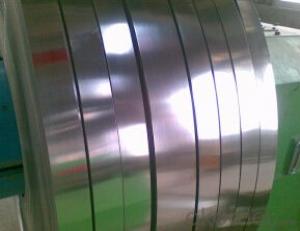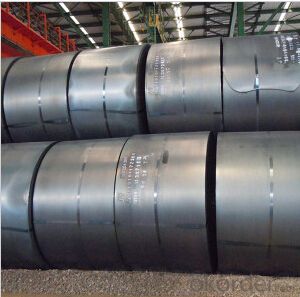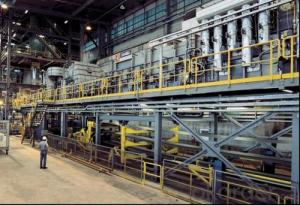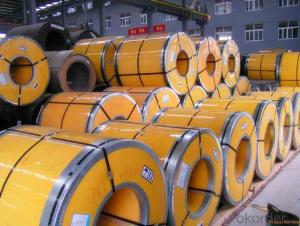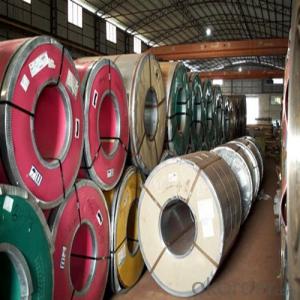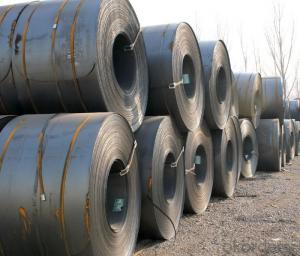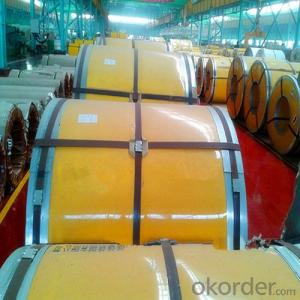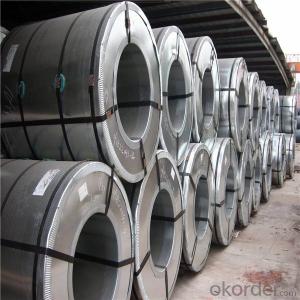Hot Rolled /Coldrolled Stainless Steel Coil with 2b/Ba Surface
- Loading Port:
- Tianjin
- Payment Terms:
- TT OR LC
- Min Order Qty:
- 25 m.t.
- Supply Capability:
- 10000 m.t./month
OKorder Service Pledge
OKorder Financial Service
You Might Also Like
Basic Info.
Model NO.:201/202/301/304
Surface Treatment:2b, Ba, Hairline, No.4, 8k, Mirror Finish etc.
Certification:ISO, SGS, BV
Technique:Cold Rolled
Standard:ASTM, JIS, GB, AISI, DIN, BS
Application:Pipe/Tube Making, Building , Kitchen Sinks/C
Edge:Mill / Slit Edge
Stock:Stock
Steel Grade:201, 202, 301, 302, 304, 304L, 316,316L
Grade:201, 202, 301, 302, 304, 304L, 316,316L
Width:20mm-1250 Mm
Thickness:0.16-3.0mm
Surface:2b, Ba, Hairline, No.4, 8k, Mirror Finish etc.
Quantity:as Request
Delivery Time:1-14 Days
Payment Term:FOB/CIF/CFR/EXW
Export Markets:Global
Product Description
it is mainly used for Pipe/tube making,building material,kitchen sinks/cutlery,baths,elevators,automotive application,industrial application,hardware-tools etc.
We are a whole industrial chain factory,main product as below :
stainless steel coil/stainless steel strip
stainless steel pipe/tube
and the Supply ability as below :
S.S HR COIL= 1000 000 TONS/ year
S.S CR COIL= 800 000 TONS/ year
s.s pipe=200 000 TONS/ year
hot rolled /coldrolled stainless steel coil with 2B/BA surface
| Material GRADE | 201, 202, 301, 304, 304L, 316, 316L |
| Standard | ASME, ASTM, EN, BS, GB, DIN, JIS, etc |
| Technique | Hot rolled / cold rolled |
| Raw material source | JHSCO or as your request |
| Width | 10mm-1250 mm |
| Thickness | 0.16mm-3.0mm |
| Quantity | as your request |
| Surface | 2B, BA, No. 4 No.1,8K, Mirror finish etc. |
| Packaging | Standard export sea-worthy packing |
| Delivery time | 1-15days |
| Supply ability | S.S HR COIL= 1000 000 TONS/ year ,S.S CR COIL= 800 000 TONS/ year,s.s pipe=200 000 TONS/ year |
| Payment terms | L/C, T/T |
| Application range | Pipe/tube making,building material,kitchen sinks/cutlery,baths,elevators,automotive application,industrial application,hardware-tools etc. |
- Q: I've seen commuters that ride fixed gear and the traditional pista bike with gears. Now, as I saw on the bianchi website that you can mount front and rear brakes on the bianchi steel pista bike and I want to use it to ride to water polo and school.I've rode the ghetto fixed gear bike but it has gotten small for me. It was an aluminum bike. How strong is the steel? Is the frame strong enough to handle 150 lbs? Will the fork break easily if I ride over some cracks? Has anyone ridden the bianchi steel bike and the fork broke? HELP?Thanks.P.S. Please don't comment how I shouldn't use a pista bike on the road, if I can mount brakes then it can be used for road purposes.
- Steel is for real, all other materials compare them to steel. Carbon is a comfortable as steel, Alu is lighter and ti is less corrosive than steel. Steel is the standard that all other bikes are measured to.
- Q: I was cutting a sheet of steel with an angle grinder when suddenly the rate at which the blade was cutting slowed way down. I tried a few different things, and turned off the tool and looked at the blade. It didn't look damaged, but it definitely was not cutting as quickly. I thought either I had hit a harder section of steel (is that possible? It looked pretty uniform) or the blade had lost it's abrasive quality or something. Also, before this happened I had accidentally cut into the wooden sawhorse that was holding up the steel sheet, but I've done that before with no problem. After a short while the problem fixed itself and the rate of cutting went back to a fast normal. Anyone know why this happened?
- Sounds like the abrasive surface got blinded, coated with something that prevented the abrasive particles from touching the steel. It is possible to have vastly different hardnesses in a single piece of steel. Case hardening, carburizing, induction hardening, heat affected zone from welding, differences in work hardening, and presence of inclusions are some of the things that can create hardness variation within a single piece. But... sounds like you are working with a sheet which is unlikely to have any of these conditions. So... it was probably the grinding disk
- Q: What is the thickness of a steel coil?
- The thickness of a steel coil can vary depending on the specific requirements and application. However, it is typically measured in millimeters or inches, ranging from a few tenths of a millimeter to several millimeters.
- Q: How are steel coils used in the production of steel connectors?
- Steel coils are used in the production of steel connectors as they serve as the primary raw material. The coils are unrolled and then processed through various manufacturing techniques, such as cutting, stamping, and bending, to shape them into the desired connector forms. These connectors are crucial components used to join different steel structures together, ensuring strength, stability, and structural integrity in various applications like construction, automotive, and engineering industries.
- Q: What's the best way to clean granite countertops and stainless steel appliances? My countertops especially always look dull and streaky. Thanks!!!!!!!
- The best home remedy for that is shaving cream. Use men's shaving cream, not the gel, and not the ones with aloe, but regular shaving cream. It'll get the crud off and it'll shine it up for you. Just make sure you wipe it down really well, so there aren't any streaks.
- Q: What are the different types of steel coil grades?
- There are several different types of steel coil grades used in various industries and applications. Some of the most common steel coil grades include: 1. Carbon Steel: This is a basic type of steel that contains mostly iron and carbon. It is widely used in construction, automotive, and manufacturing industries due to its high strength and durability. 2. Stainless Steel: This type of steel contains chromium, which provides corrosion resistance and makes it suitable for applications that require resistance to oxidation and staining. It is commonly used in the food processing, chemical, and medical industries. 3. High-Strength Low-Alloy (HSLA) Steel: HSLA steel contains small amounts of alloying elements such as copper, phosphorus, niobium, and vanadium. This type of steel offers higher strength and better mechanical properties compared to carbon steel, making it suitable for structural applications. 4. Galvanized Steel: Galvanized steel is coated with a layer of zinc to protect it from corrosion. It is commonly used in outdoor applications, such as roofing, fencing, and automotive parts. 5. Electrical Steel: Also known as silicon steel, electrical steel has high magnetic permeability, low electrical conductivity, and low core loss. It is used in the production of transformers, motors, and other electrical equipment. 6. Tool Steel: Tool steel is a high-carbon steel that is specifically designed for making tools and dies. It has excellent hardness, wear resistance, and toughness, making it suitable for cutting, forming, and shaping materials. These are just a few examples of the different types of steel coil grades available. Each grade has its own unique properties and characteristics, making it suitable for specific applications in various industries.
- Q: Can steel coils be used in the production of HVAC systems?
- Certainly, HVAC systems can make use of steel coils. In the production of HVAC equipment, like air handlers, condenser coils, evaporator coils, and heat exchangers, steel coils are frequently employed. Their durability and strength make them well-suited to endure the rigorous pressures and temperatures involved in HVAC operations. Moreover, steel coils possess favorable heat transfer properties, facilitating efficient heat exchange between the refrigerant and the conditioned air. In summary, steel coils are an dependable and widely-utilized element in the manufacturing of HVAC systems.
- Q: What are the different testing methods used for steel coils?
- There are several testing methods used for steel coils, including visual inspection, dimensional measurements, hardness testing, tensile testing, bend testing, and surface quality analysis. These methods help ensure the quality and compliance of steel coils with the specified standards and requirements.
- Q: how do i quinch steel? i heard instead of water oil will actually make it harder... wat ways are best for wat steels? and how do i tell wat kind of steel i have?... i will be doin this with my poket knife..
- boy what a though question ! let me explain. when you rapidly cool a steel from high temperatures(depending on steel type) with water or oil or other means , it is called quenching. it depends on the steel type to say if it is better to quench it with oil or water but basically in water you will have a harder steel rather than oil. for some steels if you do this you will ruin it's properties ! you can't totally tell what kind of steel do you have until you get it analyzed with Quantometer analyzer with a pocket knife it is more like an estimation and it can't be trust able generally if you can scratch the steel with your knife it means it is not a hard steel and it might not be expensive. I hope that helps but for more information i need to know more !
- Q: what is the porpose of preheating mild steel prior to welding
- ok dont listen to bob the builder down there, u preheat thicker steels to draw moisture out of them. take a propane torch to something exposed to just atmospheric air around 3 inches thick and the water will literally pour out of it. do u want that in ur weld? no. so u preheat to draw any moisture or contaminates out of the base metal. good luck.
Send your message to us
Hot Rolled /Coldrolled Stainless Steel Coil with 2b/Ba Surface
- Loading Port:
- Tianjin
- Payment Terms:
- TT OR LC
- Min Order Qty:
- 25 m.t.
- Supply Capability:
- 10000 m.t./month
OKorder Service Pledge
OKorder Financial Service
Similar products
Hot products
Hot Searches
Related keywords
